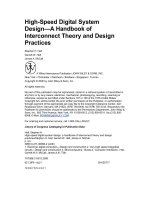Organization theory and design: Lecture 35
Bạn đang xem bản rút gọn của tài liệu. Xem và tải ngay bản đầy đủ của tài liệu tại đây (21.58 KB, 8 trang )
35
Organizational Decision Making
1
Organizational Decision Making
• Not on individual basis
• Problem identification and solution
involves many departments, multiple
view points, and even other organizations
• Many factors affect organizational
decision making, such as; internal
structure, stability or instability of external
environment
2
Organizational Decision Making
• Four types of organizational decision
making processes:
1. Management science approach
2. Carnegie model
3. Incremental decision process model
4. Garbage can model
3
Management Science Approach
• Analogous to rational decision making at
individual level
• Management science came into being during
World War II (maths, Physics, OR concepts
applied to help administer and manage military
issues)
• Example of torpedoes sinking a vessel – how
many different variables like speed, time,
distance, wind speed, shell size, curvatures etc.
will be considered
4
Management Science Approach
• Analysts then jumped in to give a headstart to management sciences, radars
replaced humans as targeting
• This approach then diffused into other
institutions and corporations and business
schools where techniques were studied
and elaborated
5
Management Science Approach
• Some examples where management science
approach has solved organizational problems:
1. Finding right spot for an office/factory
2. Test marketing a new product
3. Drilling for oil
4. Distribution of goods and now telecom services
5. Scheduling of airline employees, ambulance
technicians, telephone operators,
6
Advantages
• Can accurately and quickly solve complex
problems involving many variables
• Computer and software technology is
further augmenting the use of
management science approach
7
Failures
• Credit rating scoring by banks on the
expense of human judgment
• Quantitative data are not rich and do not
convey tacit knowledge
• It is the man behind the gun
8









